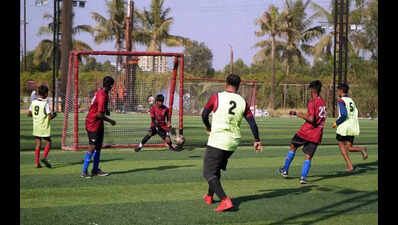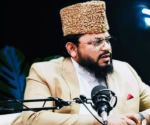City’s futsal players reach nationals, but their bigger win is off-field | Mumbai News – The Times of India

On a sprawling green turf in Thane, a 17-year-old weaves past defenders with a futsal ball at his feet. But it’s not just about speed, skill, or chasing a win. Will he play fair? Lose his temper? Lift a teammate up or tear him down? “Sport has a way of showing your true colours,” says Jesson Jose, founder of Sports Mentoring Infusion (SMI). “Talent alone doesn’t make a great sportsperson. Character does. That’s why, for us, the field isn’t just for goals. The kids learn that cheating, aggression, or putting others down won’t get them far. Teamwork, discipline, and respect will.”
Jose trains these boys on professional sports facilities in Mulund and Thane—far removed from the tough neighbourhoods they come from: Mumbai’s red-light areas, slums, and street communities. And now, after years of hard work, they have a shot at something bigger—the 4th Under-17 Boys Futsal National Championship in Nashik, starting March 28.
It’s not their first time qualifying. They made the cut last year too but had to step back for lack of funds. This time, a crowdfunding initiative helped them raise enough to cover the essentials—bus travel, jerseys, food, accommodation, and medical emergencies.
Futsal—a fast-paced, indoor version of football played on a hard court with five players per team—demands quick passing, skill, and close ball control. “Ronaldo, Messi, Ronaldinho, Mbappe, Neymar—they all credit futsal for sharpening their game,” says Jose. “If it worked for them, why not these kids?”
His game plan—‘swabhav se badho, swabhav se khelo’ (grow with character, play with character)—took him into red-light areas, juvenile homes, govt shelters, and transgender communities—where children grow up around crime, addiction, and instability. He saw sport as a way out. “Why not use futsal to shape their behaviour before trouble finds them?”
For 17-year-old Antim, who grew up under the Kurla terminus bridge and never attended school, futsal changed everything. “I’d pick up trash, do odd jobs, even beg,” he says. He started playing in 2023. Now, as team captain, he thinks differently. “Managing teammates, looking out for them—it’s changed me. I’m also in school now.” His mother was hesitant at first, but after a talk with his coach, she saw the opportunities it could bring.
Convincing families remains a hurdle. For parents struggling to make ends meet, sports can feel like a luxury. “The biggest question on their mind is, ‘Kab kamayega?’ (When will he start earning?),” says Jose. “It’s tough to explain that sports can create stability in the long run. But when they see their kids leave behind addictions—alcohol, tobacco, even phone addiction—they start seeing the good in it.”
Rohit’s story isn’t too different. He used to sell tissues on local trains to make ends meet. His parents didn’t understand his love for the sport. “They’d say, ‘Playing games won’t fill your stomach.’ So for two months, I stopped.” But he couldn’t stay away. “I kept thinking about practice.” One day, he showed up again. His coach saw determination, maybe even talent. “Both Sir and Antimbhai met my parents and explained how futsal could help.” Gradually, they came around.
Jose uses sports metaphors to drive lessons home. “In football, a red card means you’ve crossed a line. So, if they see their fathers mistreating their mothers, they should be able to say, ‘Papa, red card. This is wrong’.”
For many, violence is normal. Jose pushes them to have real conversations. “We ask them to talk to their mothers, sisters, aunts about gender-based violence. The stories shake them. Many had never thought about their struggles before.”Vivek, who grew up in Sonapur, Bhandup—a red-light area he hopes to leave behind—knows this firsthand. His father was abusive, especially toward his mother.
“When I was little, he didn’t like it when I cried. Once, he snatched me from my mother and threw me down the stairs,” he recalls. That history fuelled his anger. He was a hothead, constantly fighting, cursing, causing chaos. Futsal gave him an outlet. “One of the rules Jesson Sir made us follow was no swearing. I used to abuse a lot, but I stopped, started controlling my anger. Even my friends have picked up my habits.” For boys like Antim, Rohit, and Vivek, futsal proves that where they come from doesn’t have to define where they go.
Jose quit his marketing job three years ago to run the program seven days a week, training 450 children aged 4 to 17 who come from Bhandup, Kalwa, Kurla, Turbe, Dongri, Vile Parle. Jose is realistic about the lack of a clear professional pathway for futsal in India but remains hopeful. “Every sport starts small. A few years ago, nobody knew what pickleball was. Now it’s everywhere. Futsal has that same potential,” he says. “Even if they don’t go pro, the values they gain here will carry them through life. And that’s the real win.”
On a sprawling green turf in Thane, a 17-year-old weaves past defenders with a futsal ball at his feet. But it’s not just about speed, skill, or chasing a win. Will he play fair? Lose his temper? Lift a teammate up or tear him down? “Sport has a way of showing your true colours,” says Jesson Jose, founder of Sports Mentoring Infusion (SMI). “Talent alone doesn’t make a great sportsperson. Character does. That’s why, for us, the field isn’t just for goals. The kids learn that cheating, aggression, or putting others down won’t get them far. Teamwork, discipline, and respect will.”
Jose trains these boys on professional sports facilities in Mulund and Thane—far removed from the tough neighbourhoods they come from: Mumbai’s red-light areas, slums, and street communities. And now, after years of hard work, they have a shot at something bigger—the 4th Under-17 Boys Futsal National Championship in Nashik, starting March 28.
It’s not their first time qualifying. They made the cut last year too but had to step back for lack of funds. This time, a crowdfunding initiative helped them raise enough to cover the essentials—bus travel, jerseys, food, accommodation, and medical emergencies.
Futsal—a fast-paced, indoor version of football played on a hard court with five players per team—demands quick passing, skill, and close ball control. “Ronaldo, Messi, Ronaldinho, Mbappe, Neymar—they all credit futsal for sharpening their game,” says Jose. “If it worked for them, why not these kids?”
His game plan—‘swabhav se badho, swabhav se khelo’ (grow with character, play with character)—took him into red-light areas, juvenile homes, govt shelters, and transgender communities—where children grow up around crime, addiction, and instability. He saw sport as a way out. “Why not use futsal to shape their behaviour before trouble finds them?”
For 17-year-old Antim, who grew up under the Kurla terminus bridge and never attended school, futsal changed everything. “I’d pick up trash, do odd jobs, even beg,” he says. He started playing in 2023. Now, as team captain, he thinks differently. “Managing teammates, looking out for them—it’s changed me. I’m also in school now.” His mother was hesitant at first, but after a talk with his coach, she saw the opportunities it could bring.
Convincing families remains a hurdle. For parents struggling to make ends meet, sports can feel like a luxury. “The biggest question on their mind is, ‘Kab kamayega?’ (When will he start earning?),” says Jose. “It’s tough to explain that sports can create stability in the long run. But when they see their kids leave behind addictions—alcohol, tobacco, even phone addiction—they start seeing the good in it.”
Rohit’s story isn’t too different. He used to sell tissues on local trains to make ends meet. His parents didn’t understand his love for the sport. “They’d say, ‘Playing games won’t fill your stomach.’ So for two months, I stopped.” But he couldn’t stay away. “I kept thinking about practice.” One day, he showed up again. His coach saw determination, maybe even talent. “Both Sir and Antimbhai met my parents and explained how futsal could help.” Gradually, they came around.
Jose uses sports metaphors to drive lessons home. “In football, a red card means you’ve crossed a line. So, if they see their fathers mistreating their mothers, they should be able to say, ‘Papa, red card. This is wrong’.”
For many, violence is normal. Jose pushes them to have real conversations. “We ask them to talk to their mothers, sisters, aunts about gender-based violence. The stories shake them. Many had never thought about their struggles before.”Vivek, who grew up in Sonapur, Bhandup—a red-light area he hopes to leave behind—knows this firsthand. His father was abusive, especially toward his mother.
“When I was little, he didn’t like it when I cried. Once, he snatched me from my mother and threw me down the stairs,” he recalls. That history fuelled his anger. He was a hothead, constantly fighting, cursing, causing chaos. Futsal gave him an outlet. “One of the rules Jesson Sir made us follow was no swearing. I used to abuse a lot, but I stopped, started controlling my anger. Even my friends have picked up my habits.” For boys like Antim, Rohit, and Vivek, futsal proves that where they come from doesn’t have to define where they go.
Jose quit his marketing job three years ago to run the program seven days a week, training 450 children aged 4 to 17 who come from Bhandup, Kalwa, Kurla, Turbe, Dongri, Vile Parle. Jose is realistic about the lack of a clear professional pathway for futsal in India but remains hopeful. “Every sport starts small. A few years ago, nobody knew what pickleball was. Now it’s everywhere. Futsal has that same potential,” he says. “Even if they don’t go pro, the values they gain here will carry them through life. And that’s the real win.”
















